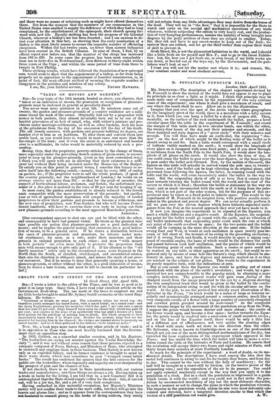GROAND Fnriar GRUB STREET ON THE BOOK QUESTION.
15 Grub Street, 22d April 1851.
San—I wrotew letter to the editor of the Times, and he was so good as to pant it in. large type. Since then, I have read your excellent article on the Government. Bookshop. The use made of- the taxes to supplant me and my little books brought to mind Mr. Sydney Smith's remarks on the taxed Eng- lishman. He writes- " Couchant or levant, we must pay: The schoolboy- whips his taxed top—the beardless youth manages his taxed.horse, with a taxed bridle, on a taxed road : and the dying Englishman, pouring his medicine which has paid 7 per cent into a spoon that has paid 15 per cent, flings himself back upon his chintz tied, which has paid 22 per cent, and expires in the arms of an apothecary who has paid a licence of a hun- dred pounds for the privilege of putting him to death. His whole property is then immediately taxed from 2 to 10 per cent. Besides the probate, large fees are de- manded for burying him in the chancel; his virtues are handed down to posterity on taxed marble; and heis then gathered to his fathers—to be taxed no more."
Now, Sir, a book pays more taxes than any other article of trade ; and it I is in. opposition to those who are most heavily burdened that the Govern- ment start an opposition shop.
Im 1832, Cobbett, on a somewhat similar occasion, said in his Register,. "Ile booksellers are crying out murder against the Useful Knowledge So ciety "; and it was not without some reason that these persona objected to a company composed of Peers, Bishops and Ministers of State, who attempted to undersell and supplant them in their business. That Society is now known only as an exploded fallacy,. and its former existence is brought to- mind by their waste sheets, which may sometimes be seen "wrapped round better books." The result has confirmed the opinion that the best caterers for the public- are the booksellers, whose ingenuity and sagacity are ever sharpened by the prospect of gain and the- chances of loss.
If not checked, there is no limit to State interference with our various. trades and manufactures ; and these things are always a job. Having taken up earade in books for the living, I am told that in a new Cemetery Bill it is contemplated that the- State should supply coffins for the dead : this, if carried out,2 will be ajob toor, Sir, and a job of a very dark complexion. Having embarked- in this mournful occupation, her Majesty's Ministers surely will nob confine their trade to the mere coffin, but they will go into
and phune nee; amine it appears from the correspondence they have not.hasitaterttecominit.piracy on the. books- of living; authors, they surely
will not refiain_from any little advantages-they inay-derive-frontthebones of the dead. They tell me in "the Row,' that It is impossible for the State to watch and carry on the mental raid? mechanical operations of any trade whatever, without subjecting the nation' to very heavy cost, and the produc- tion-of very bungling performances, besides-the liability of being brought into disgrace by the petty artifices of those they are obliged to employ- Today, Sir; they rob and have to pay smart-money to keep out of the dock ; to- morrow they are robbed, and- let go the thief rather than expose their want of skill to prevent it.
Grub Street, Sir, is not the pleasantest habitation in- the world, and I should like a-little fresh air for myself and Mrs. P., and to ge to the Great Exhibi- tion : but, Sir, how can I get fresh air, or even bread, if my little works are run down, or bowled out as the boys say, by the Government, and the pub- lishers' won't look at me?
T trust you will not let the matter rest where it is; and remain, Sir, your constant reader- and most obedient servant,
PflnA0niiofi.


























 Previous page
Previous page